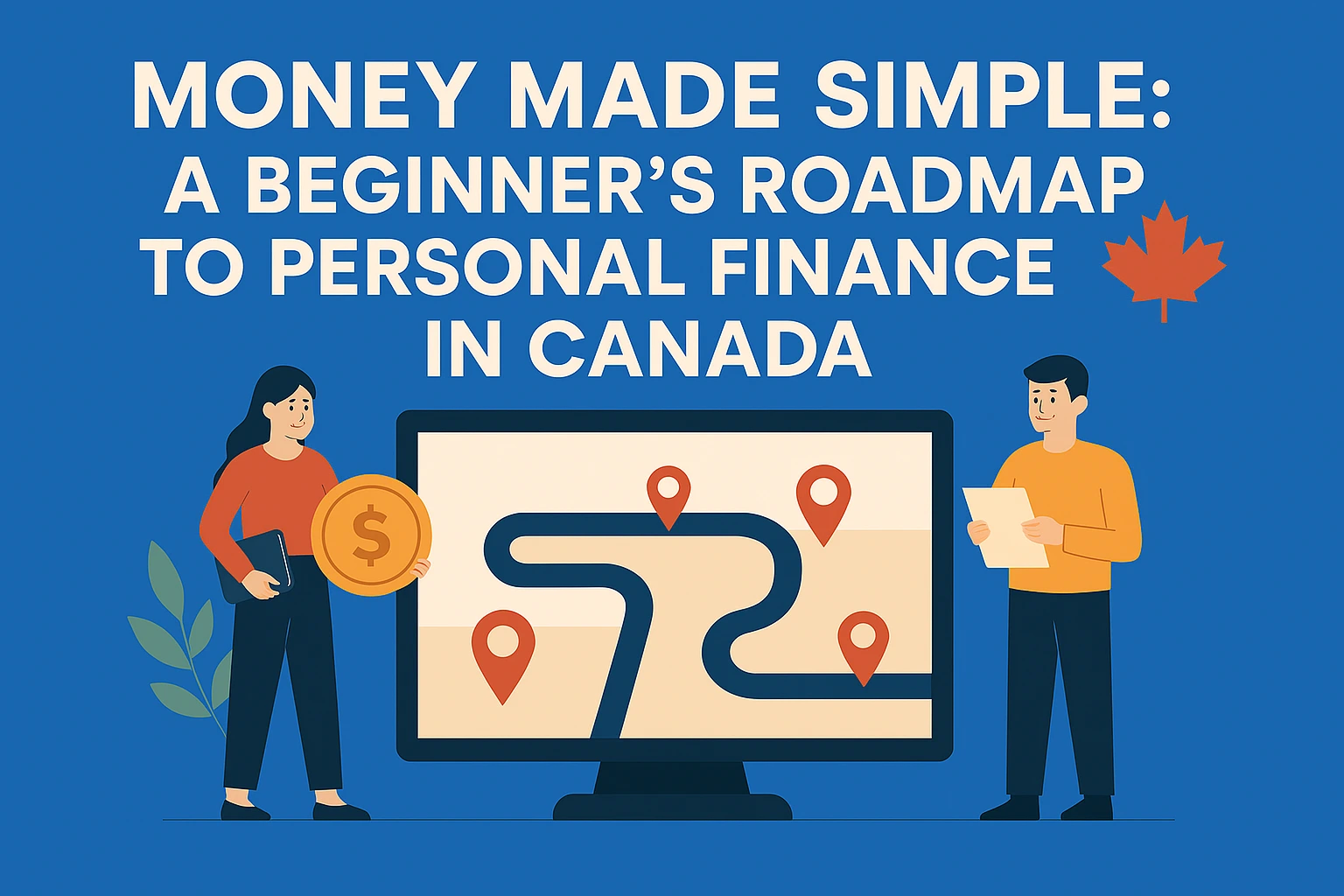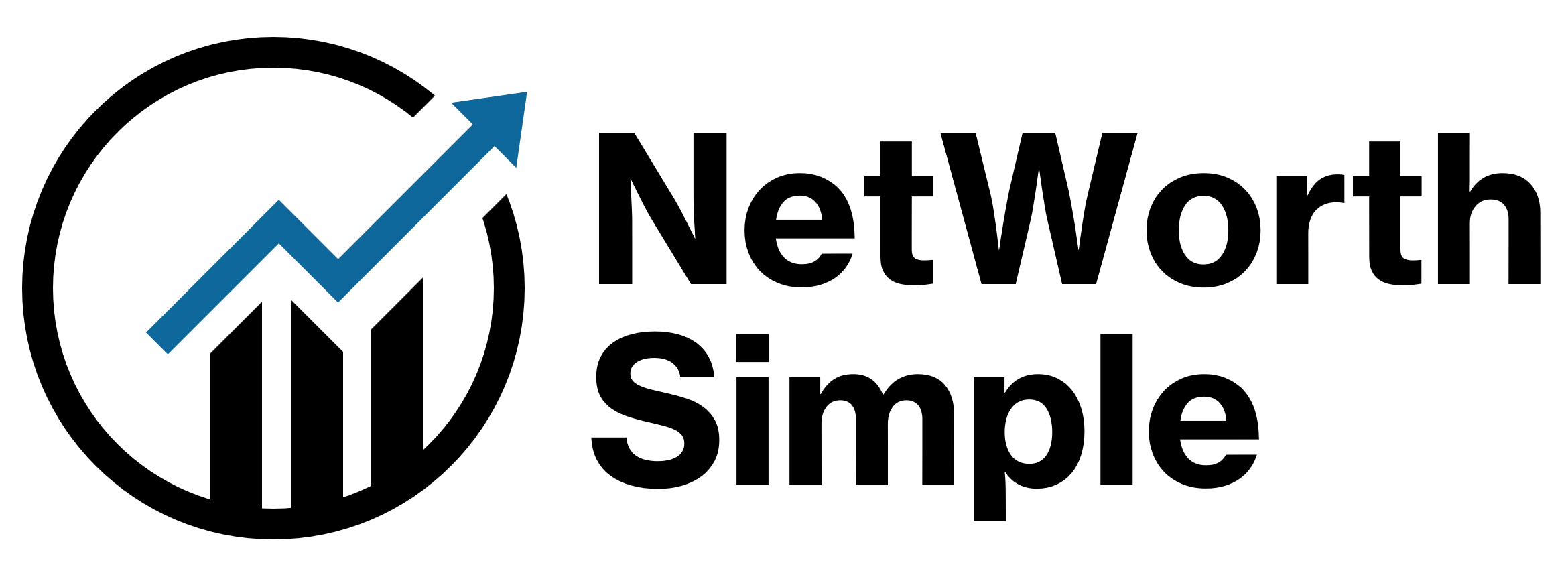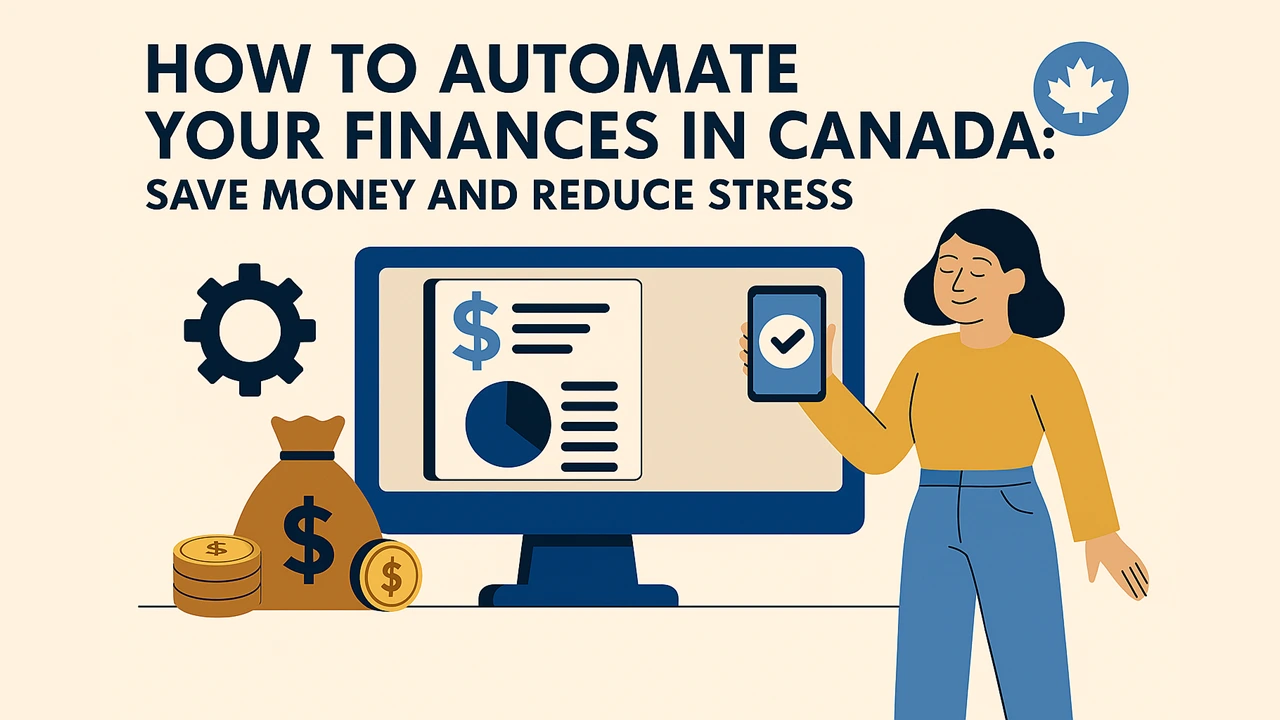Money Made Simple: A Beginner’s Roadmap to Personal Finance in Canada

Did you know that nearly half of Canadians live paycheque to paycheque — and 1 in 3 have no emergency savings at all? In a world of rising costs, managing your money isn’t just smart — it’s essential.
This beginner’s guide to personal finance in Canada breaks down everything you need to know about budgeting, saving, investing, and getting your finances on track — in plain, simple language.
By the end of this guide, you’ll understand how to take control of your money, build good habits, and feel more confident about your financial future — even if you’re starting from zero.
Ready to stop stressing about money and start building a smarter financial life? Let’s get started.
What is Personal Finance?
More than just budgeting or investing
Personal finance isn’t just about budgeting apps or buying stocks. It’s the full picture of how you earn, spend, save, borrow, protect, and grow your money over time.
Think of it like your financial health — and just like physical health, it’s made up of several key pillars working together:
|
Pillar |
Description |
|---|---|
|
Budgeting |
Managing income and expenses |
|
Saving |
Setting aside money for short-term goals or emergencies |
|
Debt Management |
Paying off what you owe efficiently |
|
Investing |
Growing your wealth for the future |
|
Insurance and Risk |
Protecting yourself from financial loss |
|
Financial Planning |
Setting goals and making long-term plans |
Why it matters (especially in Canada)
In Canada, the cost of living continues to rise, and financial stress is one of the top causes of anxiety among adults. According to a 2024 survey by FP Canada, 38% of Canadians say money is their biggest source of stress — ahead of work, relationships, and health.
Good personal finance habits help you:
- Make better daily decisions (like what to spend or save)
- Plan for big milestones (like buying a home or retiring)
- Avoid common pitfalls (like credit card debt or lifestyle creep)
It’s not about being rich — it’s about being prepared, intentional, and in control.
Personal finance is personal
What works for someone else might not work for you — and that’s okay. The best personal finance strategy is the one you’ll actually stick to. Whether you’re a single professional in Toronto or a parent managing daycare costs in Calgary, your financial plan should reflect your life, values, and goals.
💡 Pro Tip
The right financial plan isn’t the perfect one — it’s the one that works for you.
Keep reading and explore the rest of this guide to find the tools that match your lifestyle and priorities.
6 Foundations of Smart Money Management
1. Budgeting – Know Where Your Money Goes
Creating a budget is like giving your money a job. It helps you control spending, avoid unnecessary debt, and make sure your money supports your priorities. Whether you follow the 50/30/20 rule, use a free Canadian budgeting app, or use with a spreadsheet, the goal is the same: track income and expenses, and spend with intention.
💡 Pro Tip
Want to learn more about the basics of budgeting?
📖 Read our budgeting beginner guide.
2. Saving – Building a Safety Net
A strong savings habit is the backbone of financial security.
- Start with an emergency fund — enough to cover 3–6 months of basic expenses. This protects you against any big, unexpected expenses.
- Next set up is a sinking fund for larger expected expenses.
- Then work toward saving for short-term goals like travel, home repairs, or a new car.
High-interest savings accounts (HISAs) are great for Canadians who want safe, accessible growth.
💡 Pro Tip
Automate your savings and pay yourself first. Click here to learn how.
3. Debt Management – Pay Down What You Owe
Not all debt is bad — but unmanaged debt can snowball fast. Start by understanding your interest rates, then prioritize paying down high-interest balances like credit cards. Strategies like the debt snowball or avalanche method can help you build momentum.
4. Investing & Growing Wealth
Once your budget and savings are in place, investing helps your money work for you. Even small contributions can compound significantly over time. Whether you’re investing in mutual funds or ETFs, using TFSA, RRSP, or RESPs, the key is to start early and invest consistently.
💡 Pro Tip
Want to learn more about the basics of investing?
📖 Read our investing beginner guide.
5. Insurance & Risk Protection – Guard What You’ve Built
Life happens. Insurance — whether it’s health, life, home, or disability — protects you and your family from major financial setbacks. While it’s not the most exciting topic, it’s a critical part of any complete financial plan.
6. Financial Planning – Set Goals and Stay on Track
Money should serve your life — not the other way around. Financial planning helps you define what you want (early retirement? owning a home? world travel?) and build a plan to get there. Track your progress, adjust as life changes, and don’t be afraid to start small.
Tools and Accounts Every Canadian Should Know
Bank Accounts – The Basics of Spending and Saving
At minimum, every Canadian needs two essential bank accounts:
- A chequing account for everyday spending and bill payments
- A savings account for short-term savings or emergency funds
Look for accounts with low or no fees, free e-transfers, and easy mobile access. While big banks are convenient, many Canadians are switching to online banks like Tangerine, EQ Bank, or Simplii for higher interest rates and fewer fees.
|
Bank |
Interest Rate |
Monthly Fee |
Key Feature |
|---|---|---|---|
|
EQ Bank |
2.85% – 3.00% |
$0 |
High interest, no fees |
|
Tangerine |
0.30% |
$0 |
Promo offers, trusted brand |
|
Simplii |
0.40% |
$0 |
Unlimited e-transfers |
TFSA, RRSP, and HISA basics
Understanding registered accounts is a must for any Canadian looking to save or invest. Here’s a quick breakdown:
- TFSA (Tax-Free Savings Account): Grow your money tax-free — great for both short- and long-term goals
- RRSP (Registered Retirement Savings Plan): Contributions reduce your taxable income now, but you pay tax when withdrawing later
- HISA (High-Interest Savings Account): Unregistered account that earns interest with no tax sheltering
Free Canadian apps and calculators
Tracking your money doesn’t have to be hard. These tools help simplify the process:
- You Need A Budget (YNAB): Paid app, great for intentional budgeting
- Excel/Google Sheets templates: Free, customizable, and offline-friendly
- Koho / Mogo: Prepaid cards with budgeting features built in
Where to Start Based on Your Situation
“I’m living paycheque to paycheque”
If your income disappears as fast as it comes in, your top priority is spending control. Start by tracking your expenses, building a basic budget, and setting up a small emergency fund — even if it’s just $500 to start.
“I have some savings but no investments”
You’re ahead of the game — now it’s time to put your money to work. Learn the basics of investing, understand your risk tolerance, and explore beginner-friendly options like TFSAs, RRSPs, and ETFs. Don’t worry — you don’t need to be a stock market expert.
💡 Pro Tip
Even $50/month invested consistently can turn into several thousands over the years.
“I’m drowning in debt”
If debt is causing stress or keeping you from saving, your first step is a repayment plan. Focus on high-interest debt (like credit cards), explore consolidation options if needed, and consider speaking to a certified credit counselor in Canada.
📌 Optional visual: Bar chart showing how much interest adds up over time if you only make minimum payments“I just want to make smarter decisions overall”
You’re not in a crisis — but you’re ready to level up. Start by clarifying your short- and long-term goals, then build a plan around them. A solid budget, automated savings, and beginner investing strategies can help you grow your money with confidence.
Common Personal Finance Mistakes (And How to Avoid Them)
Mistake #1: Not Having a Budget
Many people avoid budgeting because they think it’s restrictive — but in reality, it’s empowering. A budget gives you control and visibility, which is especially important if you live paycheque to paycheque.
Mistake #2: Carrying High-Interest Debt
Credit card debt is one of the most expensive mistakes Canadians make. If you’re only making minimum payments, interest will pile up quickly and eat into your future financial freedom.
Mistake #3: Trying to Time the Market
Investing is important — but guessing when to buy or sell is risky, especially for beginners. Even most professionals get it wrong most of the time. Time in the market beats timing the market. Instead, focus on consistency and diversification.
Mistake #4: Ignoring an Emergency Fund
Life is unpredictable — car repairs, layoffs, or medical expenses can derail your progress if you’re not prepared. A basic emergency fund helps you stay calm and avoid high-interest borrowing when the unexpected hits.
Mistake #5: Not Setting Clear Goals
Without specific goals, it’s easy to spend money without intention. Whether it’s paying off debt, buying a home, or retiring early, setting short- and long-term financial goals gives your money a purpose.
💡 Pro Tip
Take five minutes to write down your top 3 financial priorities — you’ll be surprised how much clarity that brings.
What to Read (or Do) Next
Want to Take Control of Your Spending? Start With Budgeting
If you’re ready to stop wondering where your money goes every month, budgeting is your first step. Learn simple methods like the 50/30/20 rule, try beginner-friendly tools, and start building your spending plan today.
Ready to Grow Your Money? Learn the Basics of Investing
Once your day-to-day finances are stable, investing helps you build wealth over the long term — even if you’re starting small. We’ll help you understand TFSAs, RRSPs, ETFs, and how to get started with confidence.
Conclusion
Here’s a quick summary of the key personal finance takeaways from this guide:
- 💰 Personal finance is about how you earn, spend, save, invest, and protect your money — and it’s different for everyone.
- 🏛️ The 6 foundations of smart money management include budgeting, saving, debt management, investing, insurance, and planning.
- 🚀 Start where you are: whether you’re living paycheque to paycheque or looking to grow your wealth, there’s a path forward.
- 🔧 Use the right tools and accounts — like TFSAs, RRSPs, and high-interest savings — to make managing money easier and more effective.
- 🔥 Avoid common mistakes like carrying credit card debt, skipping your emergency fund, or trying to time the market.
Wherever you are in your journey, the most important step is the next one. Explore our budgeting and investing guides, download free tools, or sign up for the newsletter — we’ll help you take it from here.

